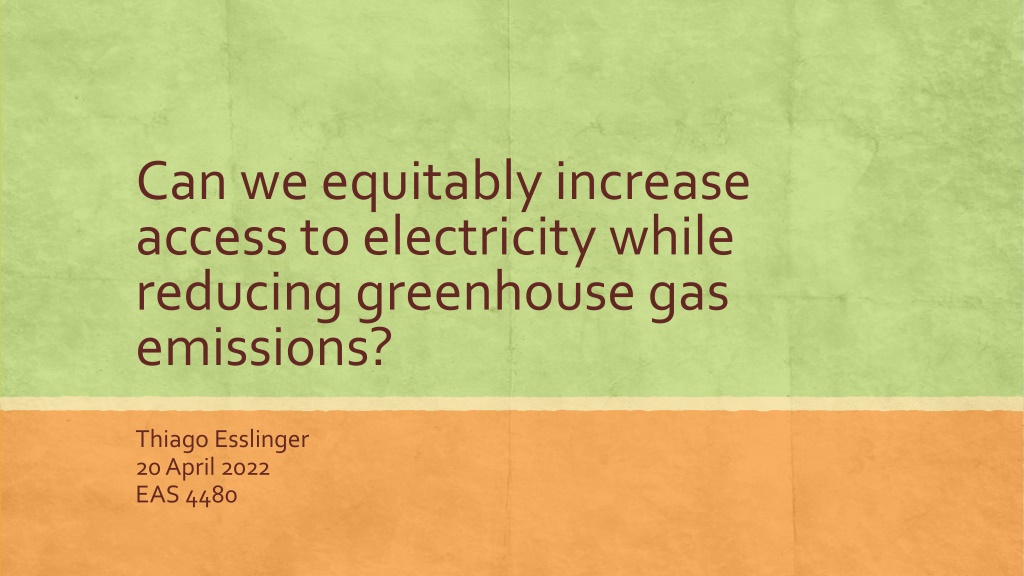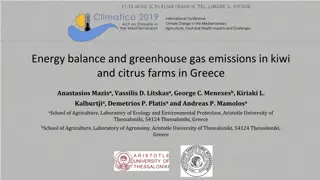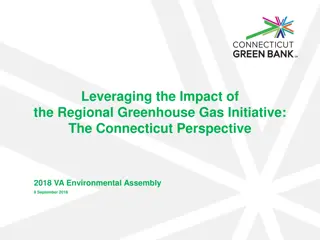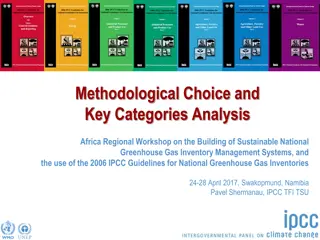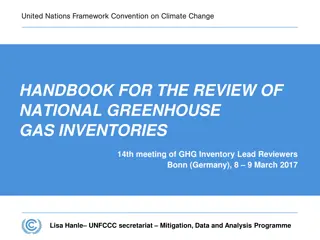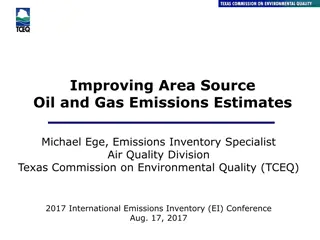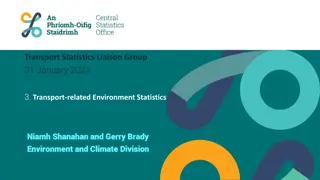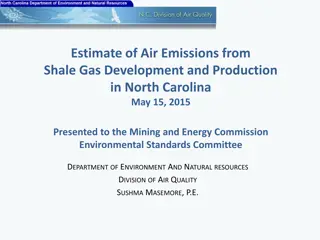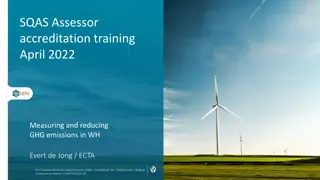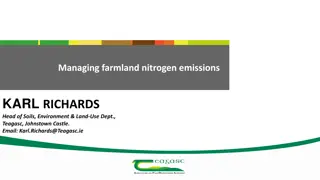Analyzing Access to Electricity and Greenhouse Gas Emissions Relationship
Through correlational analysis of access to electricity, electricity production from fossil fuels, electricity production from renewable sources, and greenhouse gas emissions across different countries, we aim to determine if there is a trend that allows for an equitable increase in electricity access while reducing greenhouse gas emissions. The data reveals varying correlations between these variables among G7 countries and developing economies, shedding light on the complex relationship between electricity access and environmental impact.
- Electricity access
- Greenhouse gas emissions
- Correlation analysis
- Renewable energy
- Global energy trends
Download Presentation

Please find below an Image/Link to download the presentation.
The content on the website is provided AS IS for your information and personal use only. It may not be sold, licensed, or shared on other websites without obtaining consent from the author. Download presentation by click this link. If you encounter any issues during the download, it is possible that the publisher has removed the file from their server.
E N D
Presentation Transcript
Can we equitably increase access to electricity while reducing greenhouse gas emissions? Thiago Esslinger 20 April 2022 EAS 4480
How to go about answering this question: Correlation between access to electricity and Greenhouse gas emissions (kt CO2 equivalent) Electricity Production from Fossil Fuels (%) Electricity Production from Renewable Sources (%) For World data 7 countries with highly developed economies (G7) 7 countries with developing economies And is there a trend in the data?
Correlation of variables Access to Electricity vs. Electricity from Fossil Fuels Country r World 0.191431 0.512084 -0.37749 0.655438 Canada NaN NaN Germany NaN NaN France NaN NaN U.K. NaN NaN Italy NaN NaN Japan NaN NaN U.S.A. NaN NaN Angola 0.295147 0.305631 -0.27915 0.713926 Bangladesh 0.873979 4.38E-05 0.640329 0.959584 Eritrea -0.32897 2.51E-01 -0.73181 0.244244 Haiti 0.938488 6.84E-07 0.812474 0.980724 Myanmar -0.67583 7.98E-03 -0.88799 -0.22645 Mozambique 0.632917 1.51E-02 0.15408 0.871003 Senegal 0.75957 1.62E-03 0.383576 0.919557 Access to Electricity vs. Electricity from Renewables Country r World 0.957761 7.48E-08 0.868553 0.986853 Canada NaN NaN Germany NaN NaN France NaN NaN U.K. NaN NaN Italy NaN NaN Japan NaN NaN U.S.A. NaN NaN Angola NaN NaN Bangladesh 0.633471 0.015007 0.154982 0.871226 Eritrea 0.328966 0.250784 -0.24424 0.731813 Haiti NaN NaN Myanmar NaN NaN Mozambique NaN NaN Senegal -0.49868 0.069506 -0.81391 0.043375 Access to Electricity vs. GHG Emissions Country r World 0.93236 1.19E-06 0.795119 0.978757 Canada NaN NaN Germany NaN NaN France NaN NaN U.K. NaN NaN Italy NaN NaN Japan NaN NaN U.S.A. NaN NaN Angola -0.05081 0.863046 -0.56613 0.493062 Bangladesh 0.966184 2.01E-08 Eritrea -0.89237 1.77E-05 -0.96571 -0.68713 Haiti 0.667564 0.00909 0.212115 0.884764 Myanmar 0.804589 0.00052 0.478117 0.935714 Mozambique -0.48411 0.079412 -0.80732 Senegal 0.532868 0.049768 0.003191 0.829051 p r_low r_high p r_low r_high p r_low r_high NaN NaN NaN NaN NaN NaN NaN NaN NaN NaN NaN NaN NaN NaN NaN NaN NaN NaN NaN NaN NaN NaN NaN NaN NaN NaN NaN NaN NaN NaN NaN NaN NaN NaN NaN NaN NaN NaN NaN NaN NaN NaN NaN NaN 0.8938 0.989506 NaN NaN NaN NaN NaN NaN 0.06253
Correlation of variables Electricity from Fossil Fuels vs. from Renewables Country r World 0.056085 0.84897 -0.48905 0.569711 Canada -0.78293 0.000929 -0.92801 -0.43168 Germany -0.91578 4.29E-06 -0.97339 -0.74926 France -0.85312 0.000105 -0.95254 -0.58928 U.K. -0.938 7.17E-07 -0.98057 -0.81108 Italy -0.97979 9.43E-10 -0.99376 -0.93556 Japan 0.872308 4.73E-05 0.636163 0.959024 U.S.A. -0.95413 1.22E-07 -0.9857 -0.85781 Angola NaN NaN Bangladesh 0.486492 0.077729 -0.05943 0.808404 Eritrea -1 Haiti NaN NaN Myanmar NaN NaN Mozambique NaN NaN Senegal -0.62131 0.017709 -0.86631 -0.13534 Electricity from Fossil Fuels vs. GHG Emissions Country r World 0.421357 0.133489 -0.14067 0.778003 Canada 0.877509 3.73E-05 0.649179 0.960767 Germany 0.836913 0.000189 0.551008 0.946985 France 0.825276 0.000279 0.524255 0.942958 U.K. 0.773078 0.001185 0.411139 0.924462 Italy 0.97149 7.29E-09 0.909942 0.991169 Japan 0.564268 0.035556 0.048084 0.842586 U.S.A. 0.935076 9.39E-07 0.802784 0.97963 Angola -0.49378 0.072735 Bangladesh 0.841742 0.00016 0.562285 0.948646 Eritrea 0.515825 0.059016 -0.02031 0.821556 Haiti 0.789144 0.000792 0.444806 0.930232 Myanmar -0.57182 0.032641 -0.84579 -0.0592 Mozambique 0.065397 0.824225 -0.4819 Senegal 0.603652 0.022265 0.107505 0.859081 Electricity from Renewables vs. GHG Emissions Country r World 0.913782 4.91E-06 0.743842 0.972743 Canada -0.7292 0.003084 -0.90834 -0.32395 Germany -0.85231 0.000108 -0.95226 -0.58734 France -0.9663 1.97E-08 -0.98954 -0.89416 U.K. -0.9043 9.00E-06 -0.96964 -0.71842 Italy -0.95487 1.11E-07 -0.98594 Japan 0.296013 0.304147 -0.27827 0.714391 U.S.A. -0.9524 1.52E-07 -0.98516 -0.85272 Angola NaN NaN Bangladesh 0.701632 0.005163 0.272494 0.897935 Eritrea -0.51582 0.059016 -0.82156 0.020314 Haiti NaN NaN Myanmar NaN NaN Mozambique NaN NaN Senegal -0.28111 0.330261 -0.70634 0.293198 p r_low r_high p r_low r_high p r_low r_high -0.86 NaN NaN -0.8117 0.049865 NaN NaN 0 -1 -1 NaN NaN NaN NaN NaN NaN NaN NaN NaN NaN NaN NaN 0.57599
Why are the correlations so? Increasing access to electricity increases demand on electricity production (mostly based on fossil fuels) This increases GHG emissions
Why are the correlations so? Increasing access to electricity increases demand on electricity production (mostly based on fossil fuels) This increases GHG emissions G7 countries electricity production from renewables has increased, but not nearly enough to effectively reduce GHG emissions
Why are the correlations so? Increasing access to electricity increases demand on electricity production (mostly based on fossil fuels) This increases GHG emissions G7 countries electricity production from renewables has increased, but not nearly enough to effectively reduce GHG emissions This data does not account for population growth which increases overall electricity production and GHG emissions Values are in % and per capita
Can we equitably increase access to electricity while reducing greenhouse gas emissions?
Can we equitably increase access to electricity while reducing greenhouse gas emissions? Yes, but so far we have not
Can we equitably increase access to electricity while reducing greenhouse gas emissions? Yes, but so far we have not Developing countries cannot be expected to reduce fossil fuel use when developed countries have the capacity to do so, and don t act accordingly.
